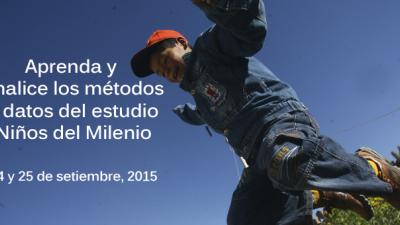
Longitudinal surveys are an important tool to analyse the circumstances and outcomes of a group of people over time, as well as to evaluate the impact of public policies and programmes over the medium or long term. Niños del Milenio, known internationally as Young Lives, is the most extensive household study currently being undertaken in Peru, and in 3 other countries: Ethiopia, India and Vietnam. Since 2002, the Niños del Milenio team has been following the lives of around 12,000 children and young people to find out more about their material and social circumstances, their hopes and aspirations as well as their views on their everyday lives, set against the environmental and social realities of their communities.
The longitudinal nature of the study enables a greater understanding of the causes and consequences of child poverty in all its dimensions. Alongside the household study, we are also carrying out qualitative longitudinal research, working with a smaller group of 50 children and young people in each country, resulting in a series of nested case studies to better understand their opinions and perceptions about their lives.
As part of the commitment to capacity-building and evidence-based policymaking, the Niños del Milenio team in Lima will be holding a 2-day workshop in September for government staff and policymakers who work with policies for children and young people at central, regional or municipal level. Places are limited to 20, and applications should be submitted by 30 August.
Further details about the course content and how to apply are available on the Niños del Milenio website (in Spanish).
Longitudinal surveys are an important tool to analyse the circumstances and outcomes of a group of people over time, as well as to evaluate the impact of public policies and programmes over the medium or long term. Niños del Milenio, known internationally as Young Lives, is the most extensive household study currently being undertaken in Peru, and in 3 other countries: Ethiopia, India and Vietnam. Since 2002, the Niños del Milenio team has been following the lives of around 12,000 children and young people to find out more about their material and social circumstances, their hopes and aspirations as well as their views on their everyday lives, set against the environmental and social realities of their communities.
The longitudinal nature of the study enables a greater understanding of the causes and consequences of child poverty in all its dimensions. Alongside the household study, we are also carrying out qualitative longitudinal research, working with a smaller group of 50 children and young people in each country, resulting in a series of nested case studies to better understand their opinions and perceptions about their lives.
As part of the commitment to capacity-building and evidence-based policymaking, the Niños del Milenio team in Lima will be holding a 2-day workshop in September for government staff and policymakers who work with policies for children and young people at central, regional or municipal level. Places are limited to 20, and applications should be submitted by 30 August.
Further details about the course content and how to apply are available on the Niños del Milenio website (in Spanish).


